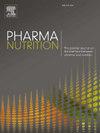Moringa oleifera leaf powder enhances glycemic control in sahrawi women with type 2 diabetes: Findings from a 3-month unblinded randomized controlled trial
IF 2.4
Q3 NUTRITION & DIETETICS
引用次数: 0
Abstract
Complementary plant-based medicine is used in developing countries to address healthcare challenges and limited access to conventional medicines. Moringa oleifera has been studied for its anti-diabetic properties, but human studies are limited. This study evaluated the long-term effect of daily M. oleifera leaf powder consumption on glycemic control in Sahrawi women with type 2 diabetes. A 3-month unblind randomized controlled trial was conducted with 45 Sahrawi women treated with oral glucose-lowering drugs. Participants were divided into two groups: an experimental group (30 women) and a control group (15 women). The experimental group received 10 g of M. oleifera leaf powder daily, while the control group did not consume Moringa. Anthropometric and glycemic parameters (fasting glucose and glycated hemoglobin) were measured at baseline and after 3 months. A proximate and phenolic analysis of plant material was also performed. M. oleifera leaves were rich in protein, fiber, and quercetin- and kaempferol-glucosides. After 3 months, the experimental group showed a significant reduction in body fat (-1.5 %, 95 %CI: −2.5, −0.5, p < 0.001) and improved glycated hemoglobin levels (-0.59 %, 95 %CI: −0.93, −0.25, p < 0.001), while these parameters remained unchanged in the control group. In conclusion, daily M. oleifera consumption, alongside drug therapy, may improve glycemic control in type 2 diabetes. Further studies are recommended to confirm these findings.
辣木叶粉增强撒哈拉妇女2型糖尿病的血糖控制:来自3个月的非盲随机对照试验的发现
发展中国家使用植物性补充药物来解决卫生保健挑战和常规药物获取受限的问题。辣木已被研究其抗糖尿病特性,但人体研究有限。本研究评估了每天食用油棕叶粉对2型糖尿病撒哈拉妇女血糖控制的长期影响。对45名接受口服降糖药治疗的撒哈拉妇女进行了为期3个月的非盲随机对照试验。参与者被分为两组:实验组(30名女性)和对照组(15名女性)。实验组每天给予辣木叶粉10 g,对照组不给予辣木粉。在基线和3个月后测量人体测量和血糖参数(空腹血糖和糖化血红蛋白)。还进行了植物材料的近似和酚类分析。油橄榄叶含有丰富的蛋白质、纤维和槲皮素、山奈酚糖苷。3个月后,实验组的体脂显著降低(-1.5 %,95 %CI: - 2.5, -0.5, p <; 0.001),糖化血红蛋白水平显著提高(-0.59 %,95 %CI: - 0.93, - 0.25, p <; 0.001),而对照组的这些参数保持不变。综上所述,在药物治疗的同时,每日食用油橄榄可改善2型糖尿病患者的血糖控制。建议进一步的研究来证实这些发现。
本文章由计算机程序翻译,如有差异,请以英文原文为准。
求助全文
约1分钟内获得全文
求助全文
来源期刊

PharmaNutrition
Agricultural and Biological Sciences-Food Science
CiteScore
5.70
自引率
3.10%
发文量
33
审稿时长
12 days
 求助内容:
求助内容: 应助结果提醒方式:
应助结果提醒方式:


